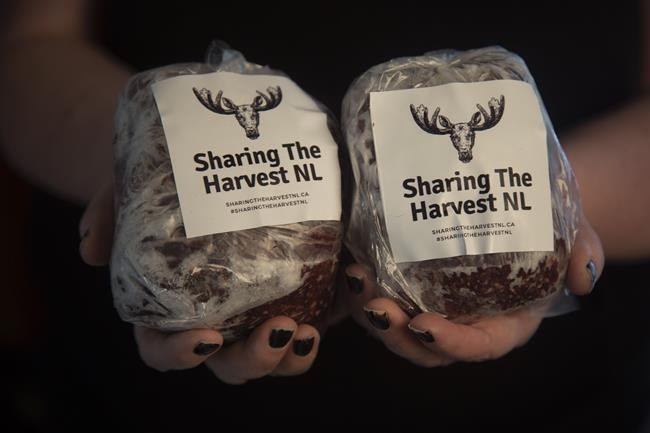
Debbie Wiseman holds Sharing the Harvest NL Packaged Moose meat in St. John’s, NL on Monday, November 16, 2020. A proposed legislative change in Newfoundland and Labrador could give residents using food banks a homegrown source of protein. THE CANADIAN PRESS/Paul Daly
Republished October 26, 2022 - 1:27 PM
Original Publication Date October 26, 2022 - 9:46 AM
ST. JOHN'S, N.L. - A proposed legislative change in Newfoundland and Labrador would give residents using food banks a homegrown source of protein.
After a two-year pilot project allowing hunters to donate moose and other meat to food banks across the province, Derrick Bragg, the minister of fisheries, forestry and agriculture, has asked to make the rules permanent. The changes are now working their way through the provincial legislature.
For Jody Williams, who runs the Bridges to Hope food bank in St. John's, the timing couldn't be better. Demand for food hampers is climbing steadily, he said in an interview Wednesday -- especially among seniors and working people.
"One of the things our clients are requesting more of in their hampers is protein," Williams said. "Of course with the rising cost of food, that's something that we're unable to afford to put in there."
And besides, he said, “we do have a culture of moose hunting here.”
The island of Newfoundland is home to about 117,000 thousand moose, which is more moose than there are people in St. John's. At about one moose per square kilometre of land, Newfoundland has the highest density of moose in the country.
It's perhaps then no surprise that moose hunting is a popular Newfoundland past time. The province even provides its past and current premiers with complimentary moose hunting licenses.
Barry Fordham has been asking the government to allow hunters like him to share their harvest with food banks for over a decade. He helped launch the pilot project in 2020 with his group Sharing the Harvest N.L.
“We hunters have a history of sharing with family and friends, and now this gives us another outlet,” he said in an interview Wednesday. “It gives us a great feeling. I’ve got goosebumps on my arms just thinking about it.”
Fordham noted it's not just about moose. Through Sharing the Harvest, he said he's helped hunters donate caribou meat as well as capelin, the silvery smelt fish that show up around the island each June in massive, shimmering schools.
Williams said seniors tend to be particularly thrilled to have moose meat in their Bridges to Hope hampers, as they were most likely to have grown up on it.
Hunters must first have their meat processed and ground by a registered butcher before they can donate it, or they can donate it to Sharing the Harvest, which can have it processed for them. The meat arrives at participating food banks divided and packaged into meal-sized portions, Williams said.
When the pilot project launched, the Newfoundland and Labrador Outfitters Association donated large freezers to food banks in communities including Gander, Deer Lake and Happy Valley-Goose Bay so they could participate.
Williams said the packs of ground meat are ideal for clients who only have hot plates to cook with, as they can use it to make tacos or sloppy joes. He spoke of a hunter who this week gave Bridges to Hope about 100 pounds of moose meat. "And it's pretty much gone," he said.
This report by The Canadian Press was first published Oct. 26, 2022.
News from © The Canadian Press, 2022